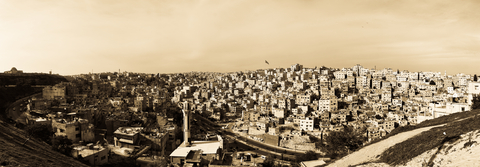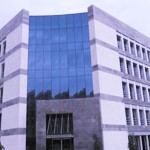
[Updated Oct 2020] A guide to serviced offices and office space to rent in Amman as well as general information that may be useful if you are thinking of renting offices in Amman.
For further offices information or to search office space for rent in Amman just click. Or contact us for any other query.
History & Geography
As well as being the capital and largest city in the country of Jordan, Amman is one of the oldest population centres in the world. Situated among the low rolling hills of north-western Jordan, Amman is slightly north-west of the Dead Sea and borders Israel, Saudi Arabia, Iraq, Syria and Lebanon. Originally the city occupied seven hills but has since expanded to 19. Amman and the surrounding area has been inhabited since the Neolithic era. By the 13th century, it was the capital of the Ammonite kingdom but was later occupied by the Assyrians, followed by the Persians and finally the Macedonians. Eventually, in 106 CE the city fell under the control of the Roman Empire. During the Byzantine era, Amman grew in importance and became a bishopric and the site of several major churches. Subsequently, Amman continued to thrive when it came under the control of the Caliphates, Umayyads and Abbasids. However, disaster struck in the form of several major earthquakes, reducing Amman to ruins. The city did not truly begin to prosper again until the construction of the Hejaz railway, which linked Damascus to Medina and made Amman an important trading centre. In 1921 the city was chosen by King Abdullah to be the capital of the newly created state of Transjordan, later simply Jordan. In 1949 and later in 1963 the population of the city expanded rapidly due to a massive influx of Palestinian refugees. Later many Southeast Asians also emigrated to the city in search of work. After the first and second Gulf Wars, another wave of refugees settled in Amman, this time from Iraq. The last decade has seen the city expand rapidly, with new areas of the city being founded constantly. Construction has been especially heavy on the outskirts of the city where many new suburbs are being built.
Economy
As the largest and most developed city in Jordan, Amman functions as a regional hub of trade and industry. Among the main industries in the city are communications, IT, medical tourism, and transportation. Of late, however, the city has also made great strides in the real estate, banking, construction and finance sectors. Previously Amman had a ban against constructing buildings more than four storey’s in height, however that has since been lifted and several skyscrapers are now under construction in the centre of the city. Amman is making strides in rapidly expanding its infrastructure to support more business, including expanding Queen Alia International Airport, expanding roadworks and constructing a modern public transportation system, including a new national railway. Furthermore, Amman has recently successfully transformed itself into the ‘Silicon Valley’ of the region, even outstripping other well-known cities such as Dubai and Tel Aviv. Also, many international businesses and diplomatic missions have their offices in Amman. The tourism industry has grown rapidly in Jordan of late and Amman has played a large role in this, as all international visitors must pass through the city upon arriving in Jordan.
Tourism & Culture
As one of the most sophisticated and visitor-friendly cities in the Arab world, Amman has a thriving tourist industry. The city boasts a mild climate with long, hot, dry summer and cool and wet winters. However, its beautiful weather is only part of the reason Amman is so popular with tourists. Amman boasts a number of cultural and historical sites such as the Jabal al-Qal’a citadel constructed in Roman times and home to the Temple of Hercules. The Roman Forum and Roman theatre, both dating back to the second century CE are also major draws for tourists interested in the region’s history. The Jordan Archaeological Museum is widely recognized as one of the best of its kind in the world and houses ancient artefacts from the across the region. For visitors in search of more lively pursuits, Amman has much to supply. The city is one of the most liberal in the region and has a bustling nightlife, including numerous nightclubs and bars, mostly based in the western area of the city. Sweifieh, in particular, is famous as the city’s red-light neighbourhood. The restaurant scene in the city is also among the finest in the region, boasting everything from traditional Jordanian dishes to Italian to French cuisine. Many people also come for the Amman Summer Festival, which usually takes place in July and features traditional Jordanian dancing and music.
Transportation
Amman is served by the Queen Alia International Airport, located about 19 miles south of the city. The airport is the hub for Royal Jordanian, one of the largest airlines in the region. Almost six million passengers flew through the airport every year. Currently, the city itself is devising a new transport infrastructure which will include dedicated lanes for bus services. The Bus Rapid Transit project is expected to be finished in 2012 and will consist of high capacity buses running at three-minute intervals during peak travel times. Plans are also in place to construct a three-line metro system throughout the city, though construction has not yet begun.

Office space to rent in Amman
Over the last few years, demand for office space in Jordan’s capital has grown immensely. This is due to the rapid expansion of Jordan’s economy and appeal of Amman to international companies wishing to do business in the region. The recent free trade agreements, as well as the conflict in other parts of the region, have only boosted this demand. Rent in the capital ranges from JD 69 to JD 166 per square meter. The neighbourhood of Shmeisani has become the main business area of the capital and has a multitude of office space. Some have predicted a problem of oversupply occurring in the future due to the economic climate, though this remains to be seen.
Our office space search, advisory and acquisition services are FREE, always. Our Amman office space brokers and agents are globally regulated by the Royal Institution of Chartered Surveyors (RICS) ensuring the highest standards of commercial property advice and service at all times.
